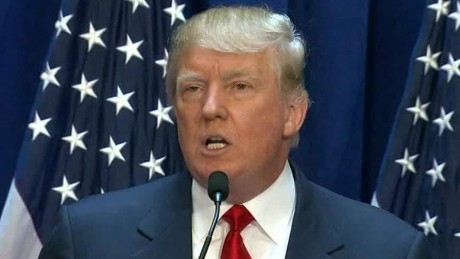By Syed Qamar Rizvi.

After resuming his office as the 45th president of the United States, Donald Trump is being seen as playing with political jugglery richly reflected by his Israeli tilt as he has been thinking of shifting the Israeli embassy to Jerusalem and now he is caught in delivering his current orientation of looking beyond the scope of a two state- solution. For international peace community and the Mideast policy experts these developments are unworthy and alarming signs to the future of Mideast peace dialogue.
In a press conference with Israeli Prime Minister Benjamin Netanyahu, he said that he would not insist on a two-state solution to the Israeli-Palestinian conflict. That means no longer committing to the creation of a Palestinian state; one that would exist peacefully alongside Israel.
“I thought for a while the two-state looked like it may be the easier of the two, but honestly, if Bibi and if the Palestinians — if Israel and the Palestinians are happy, I’m happy with the one they like the best,” Mr. Trump said.
With Israeli Prime Minister Benjamin Netanyahu at his side, President Trump on Wednesday dropped the decades-old U.S. position that Middle East peace requires the creation of a viable Palestinian state. The unpredictable commander in chief also watered down campaign-trail pledges to move America’s embassy in Israel from Tel Aviv to Jerusalem and dismantle the Iran nuclear deal.
The so-called two-state solution, under which Palestinians would get their own state, has underpinned Middle East peace efforts for a generation. In January 2001, Bill Clinton became the first sitting U.S. president to explicitly declare that “there can be no genuine resolution to the conflict” without one. Nine months later, George W. Bush became the first to make this official U.S. policy. Since taking office, Trump and his top aides had omitted it from public statements. The Palestinians are unlikely to accept a peace agreement that does not give them an independent state.
While the remarks appeared to delight Netanyahu, Trump seemed to surprise his guest by calling publicly for a pause in Israeli home building on Palestinian land. “I’d like to see you hold back on settlements for a little bit,” the president said.
“There are two prerequisites for peace,” said the Israeli prime minister. “First the Palestinians must recognise the Jewish state.
“Second, in any peace agreement, Israel must retain the overriding security control over the entire area west of the Jordan River.”
Trump bolstered his pro-Israel credentials by announcing that the US Embassy will move to Jerusalem, but he has also talked about the importance of being neutral in the Israeli-Palestinian conflict. He urged Obama to veto the recent UN Security Council Resolution but suggested he could deploy his legendary negotiating skills to broker an Israeli-Palestinian deal.
None of this adds up to a coherent set of policies to achieve long term solutions to serious conflicts. But the analysts striving to understand how a coherent strategy can be carved out of this mess are missing this point. The Twitter President cares about image and impact, guided by his instincts. Trump is not interested in long term consequences and this approach is bolstered by his loose relationship with reality.
Meanwhile the Palestinian presidency stressed its commitment to a two-state solution and an end to the Israeli occupation, Reuters news agency reported. Earlier officials had urged the White House not to abandon the concept of a Palestinian state.
Trump bolstered his pro-Israel credentials by announcing that the US Embassy will move to Jerusalem, but he has also talked about the importance of being neutral in the Israeli-Palestinian conflict. He urged Obama to veto the recent UN Security Council Resolution but suggested he could deploy his legendary negotiating skills to broker an Israeli-Palestinian deal.
None of this adds up to a coherent set of policies to achieve long term solutions to serious conflicts. But the analysts striving to understand how a coherent strategy can be carved out of this mess are missing this point. The Twitter President cares about image and impact, guided by his instincts. Trump is not interested in long term consequences and this approach is bolstered by his loose relationship with reality.
Though president trump has shown his reservation now over Israeli policy of settlements, yet his call for not focusing on a two-state solution has created warranted and qualified doubts and apprehensions in the Palestinian community over his intentions to handle this issue of the Arab-Israeli conflict
Seen by his power play tactic to reinvent a new American doctrine of change and development, Trump, an author of ‘the art of the deal’ has been losing a balance that is much required for such a sensitive office to regulate the global affairs. What important policy considerations and appraisals that Mr Trump severely needs to review are: his call for Muslim exclusivism in the United States; his overriding and gravitating tilt towards Israel; his policy style of jumping to the conclusions. By all justifiable imperatives, President Trump must evolve his foreign policy strategy on a paradigm of cautious pragmatism rather than trying adventurism in the US foreign policy. As for Middle East peace negotiating deal, no such emotional carriers could be successful to achieve a peace deal. Much thoughtful deliberations led by an insightful mediation needs to followed up.


